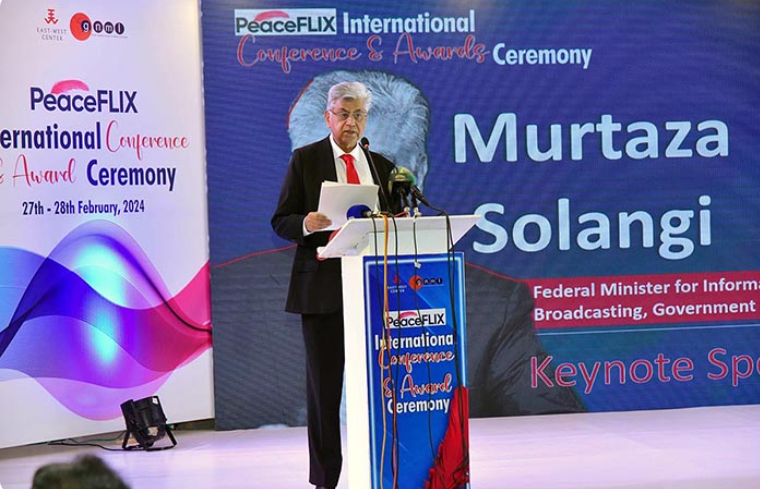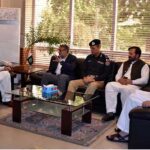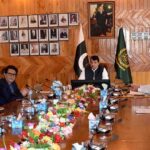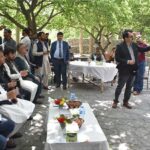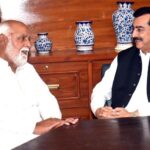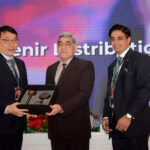ISLAMABAD, Feb 27 (APP): Federal Minister for Information, Broadcasting and Parliamentary Affairs Murtaza Solangi said on Tuesday that the Government of Pakistan, international institutions and grassroots organizations had been contributing uniquely for promoting peace, tolerance, and harmony in the country.
Delivering his speech on ” Policymaking and peace process in Pakistan” at the opening session of PeaceFLIX international conference and awards ceremony, he said in the intricate tapestry of Pakistan’s landscape, the pursuit of peace had transcended individual endeavors; it had become a shared responsibility.
“We stand witness to the collective efforts of various entities that are shaping the bedrock of peace within our nation”, he maintained.
“As our nation crosses the complex realms of economics, politics, and environmental concerns, the preservation of societal peace assumes paramount significance”, the minister added.
Solangi said that national and international think-tanks, as well as peace organizations, had conducted invaluable research and facilitated dialogues to comprehend the nuanced dynamics of peace and conflict.
He said that their endeavors extended supporting initiatives countering violent extremism, managing conflicts, and fostering a deeper understanding of conflict prevention and resolution.
He opined that media houses and journalists served as potent agents of change, challenging extremist ideologies and championing inclusivity.
“Their pivotal role in amplifying voices of moderation and facilitating dialogue across cultural divides is instrumental in forging connections between disparate groups”, he remarked.
The minister said that in the pursuit of peace, political parties had to shoulder immense responsibility as their backing for reconciliation and mutual respect underscored the profound impact of politics in fostering peace.
He said that National Counter Terrorism Authority (NCTA) stood as a cornerstone institution, coordinating nationwide counter-terrorism efforts.
“The authority’s commitment to combating extremism and preserving security demonstrates a steadfast dedication to safeguarding Pakistani citizens from threats posed by militant groups,” the minister said.
He said that expanding the realm of peace-builders, initiatives by the US Embassy Islamabad for sustainable peace and conflict prevention in Pakistani society were commendable.
Similarly, the East-West Center, bridging the gap between the East and West, contributed significantly to peace and tolerance in Pakistani society, Solangi added.
He pointed out that these organizations had catalyzed transformation within vulnerable communities in Pakistan, particularly in rural areas.
The minister said that the Sustainable Development Policy Institute (SDPI), a Pakistani think tank, significantly contributed to strengthening democracy, good governance, and peace in the country.
He said that another prominent Pakistani think tank, the Jinnah Institute, had conducted crucial policy research, strategic analysis, and public opinion polling related to peace and security.
Similarly the Center for Peace and Development Initiatives (CPDI) had promoted transparency, accountability, and citizen participation in peace-building efforts, reinforcing the collective commitment to a harmonious society, he added.
The minister said in the realm of peace-building in Pakistan, various organizations, including government bodies, civil society organizations and research institutions, had actively implemented policies and programmes aimed at promoting peace, tolerance, and harmony in the country.
He said that the government institutions such as the Ministry of Interior, Ministry of Foreign Affairs, and Ministry of Human Rights had spearheaded initiatives like the National Action Plan (NAP) to counter terrorism and extremism.
These policies were crucial in addressing the root causes of conflict and promoting stability within the nation, he added.
“Civil society organizations play a significant role in promoting peace and social cohesion. Research institutions like the United States Institute of Peace (USIP) have been instrumental in conducting policy-relevant analytical work that contributes to a greater understanding of peace and conflict dynamics in Pakistan,” the minister said.
He said that the USIP’s efforts included supporting Track 1.5 and II diplomacy between India and Pakistan to facilitate peace-building, assessing Pakistan’s counter-terrorism challenges comprehensively, and understanding violence dynamics in cities like Karachi.
He said it was an honour to acknowledge the contributions of peace-builders from diverse ethnicities and cultures across Pakistan.
“In the presence of international delegates, particularly from the East-West Center (EWC), we showcase Pakistan’s balanced and progressive approach toward development and stability”, he maintained.
The minister said that the event served as a clarion call to both national and international peace-builders, urging them to contribute to the shared goal of fostering a society of peace.
He said shifting focus to the role of government, ministries such as Interior, Foreign Affairs, and Human Rights played pivotal roles in formulating policies that promoted peace and stability.
The National Action Plan (NAP), a strategic framework developed by the government, addressed terrorism and extremism by implementing measures to strengthen the criminal justice system and regulate seminaries, he added.
Through collaboration with government bodies, civil society organizations, and research institutions, these policy initiatives significantly contributed to the broader peace process in Pakistan, Solangi said.
“They enhance our understanding of conflict dynamics, build local capacity in conflict prevention and resolution, support innovative projects for countering violent extremism, and promote dialogue among diverse groups”, he said adding through these concerted efforts, Pakistan moved closer toward a more peaceful, tolerant, and harmonious society.

